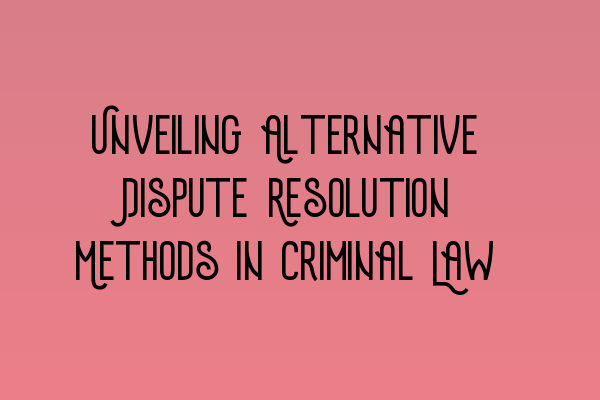Unveiling Alternative Dispute Resolution Methods in Criminal Law
In the field of criminal law, disputes and conflicts are a common occurrence. Traditionally, these disputes were primarily resolved through court proceedings, prolonging the resolution process and causing significant strain on the justice system. However, in recent years, alternative dispute resolution (ADR) methods have emerged as effective alternatives, allowing parties to resolve their differences outside of the courtroom.
ADR methods provide a range of options that can be tailored to the unique circumstances of each case. These methods include negotiation, mediation, and arbitration. Let’s take a closer look at each of these ADR methods and how they can benefit the criminal law landscape.
1. Negotiation
Negotiation is a process where the parties involved engage in discussions to find a mutually agreeable solution. This method allows for direct communication between the parties, giving them the opportunity to express their concerns and interests. In criminal law cases, negotiation can be particularly useful when dealing with less serious offenses or first-time offenders. It offers an opportunity for the accused to take responsibility, make amends, and avoid lengthy court proceedings. Moreover, negotiation can lead to creative solutions that address the underlying issues and promote rehabilitation.
For instance, in cases involving minor theft, the accused may agree to participate in community service or attend counseling sessions in exchange for dropping the charges. This approach not only benefits the offender by providing them with an opportunity to rectify their behavior, but it also alleviates the burden on the court system, allowing resources to be allocated to more serious cases.
2. Mediation
Mediation involves the assistance of a neutral third party, known as a mediator, who facilitates communication and guides the parties towards a resolution. Unlike negotiation, where the parties themselves engage in direct discussions, mediation introduces an unbiased intermediary to help them navigate the complexities of the dispute. Mediation is particularly effective in cases where emotions may run high or where there is a need for ongoing relationships, such as in cases of domestic violence or workplace disputes.
Mediators are trained professionals skilled in conflict resolution and communication techniques. They work with the parties to identify their underlying interests, explore potential solutions, and encourage dialogue. This process promotes understanding and often leads to outcomes that are mutually acceptable and sustainable. Mediation can be significantly more cost-effective and efficient compared to court proceedings, which makes it an attractive option for resolving criminal law disputes.
3. Arbitration
Arbitration is a more formal ADR method where the parties present their case to an impartial third party, known as an arbitrator, who makes a binding decision. Unlike mediation or negotiation, where the parties have control over the outcome, arbitration involves a decision made by the arbitrator based on the evidence and arguments presented. This method is commonly used in complex criminal law cases that require expertise in specific areas, such as financial fraud or cybercrime.
Arbitration offers a number of advantages in criminal law cases. It provides a faster resolution compared to court proceedings and allows the parties to select an arbitrator with expertise in the relevant field. The proceedings are private and confidential, offering a level of discretion that may be desirable in certain cases. Additionally, the arbitrator’s decision is final and binding, providing certainty and closure for the parties involved.
As the criminal law landscape continues to evolve, it is essential to explore alternative dispute resolution methods that offer efficient and effective solutions. ADR methods such as negotiation, mediation, and arbitration have proven to be valuable tools in resolving criminal law disputes. They promote communication, understanding, and creativity, while also reducing the strain on the justice system.
If you would like to learn more about alternative dispute resolution methods in criminal law or explore other related topics, check out these articles:
- SQE 1 Practice Exam Questions
- SQE 1 Practice Mocks FLK1 FLK2
- SQE 2 Preparation Courses
- SQE 1 Preparation Courses
- SRA SQE Exam Dates
At SQE Criminal Law & Practice Law UK, we understand the importance of staying up-to-date with the latest legal trends and developments. Our team of experienced solicitors is dedicated to providing comprehensive legal solutions and expert advice. Contact us today to learn more about our services and how we can assist you in your legal matters.
